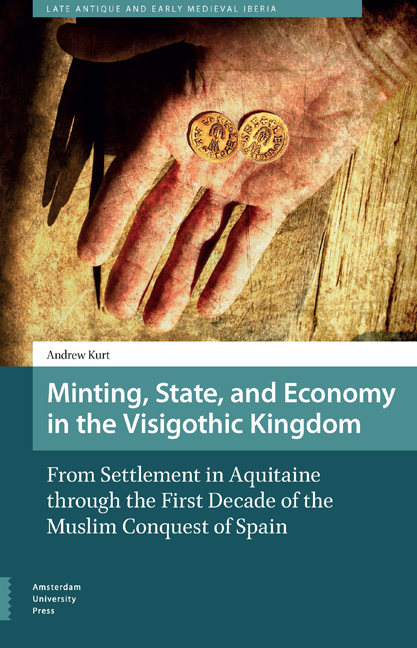 Minting, State, and Economy in the Visigothic Kingdom
Minting, State, and Economy in the Visigothic Kingdom Book contents
- Frontmatter
- Contents
- List of figures
- Acknowledgments
- Introduction
- 1 Pre-Regal Visigothic Coinage
- 2 The King’s Coinage: The Beginning and Development of theRegal Coinage (c. 573-c. 720) 81 A The Transition to a Regal
- 3 The Activities of the Mints from c. 573- c. 720
- 4 Why Were Gold Coins Struck in the Visigothic Kingdom?
- 5 The Royal Control of Visigothic Minting
- 6 Coinage in Spain in the Aftermath of the Islamic Conquest
- 7 Visigothic Currency in the Early Medieval Economy
- Conclusion
- Appendix I
- Appendix II
- Bibliography
- About the Author
- Index
7 - Visigothic Currency in the Early Medieval Economy
Published online by Cambridge University Press: 21 November 2020
- Frontmatter
- Contents
- List of figures
- Acknowledgments
- Introduction
- 1 Pre-Regal Visigothic Coinage
- 2 The King’s Coinage: The Beginning and Development of theRegal Coinage (c. 573-c. 720) 81 A The Transition to a Regal
- 3 The Activities of the Mints from c. 573- c. 720
- 4 Why Were Gold Coins Struck in the Visigothic Kingdom?
- 5 The Royal Control of Visigothic Minting
- 6 Coinage in Spain in the Aftermath of the Islamic Conquest
- 7 Visigothic Currency in the Early Medieval Economy
- Conclusion
- Appendix I
- Appendix II
- Bibliography
- About the Author
- Index
Summary
Abstract
Chapter Seven addresses the use of coinage in the kingdom, considering the level of monetization in Visigothic society and the Mediterranean contexts of currency's functioning. An argument for a largely monetized economy draws from both written references to gold coins and archeological studies. Copper-based currency is seen to have played the larger role in society across large areas especially in southern Iberia, where monetary circumstances and contacts with Mediterranean regions display greater commonality than has been widely supposed. Economic interactivity is linked to early medieval Spain's shifting regionalism.
Keywords: economy; monetization; circulation; bronze; Mediterranean; Currency
The Other Side of the Coin
This book has addressed why coinage was struck, bronze and silver briefly in Chapter Two and gold more extensively in Chapter Four. In this final chapter, we flip to the other side of the coin, so to speak, to focus on how coinage was used. From the start, it is important to recognize usage is not the same as the state's purpose in minting, especially from the point of view taken in the earlier chapters. Under consideration here is the role of coinage in the economy, after and apart from minting. Bringing together a range of evidence will help to address the broader – and rather challenging – issue of the degree of monetization, signified by currency availability and utility, but by a strict definition “the share of transactions that are handled via the market and which involve the use of money.” By no means can the full scope of the Visigothic economy be surveyed in this section, and the backdrop of causative factors in economic behavior will rest on references to specific studies. One major point of reference in the last dozen years may serve for the general setting in which the place of early medieval currency must be underscored. Chris Wickham's Framing the Early Middle Ages: Europe and the Mediterranean, 400-800 established an excellent framework for considering the grand scale, in which economy and state are examined in interrelation and are viewed in one realm astride another for depth of comparison as well as an understanding of a whole process through several centuries.
- Type
- Chapter
- Information
- Minting, State, and Economy in the Visigothic KingdomFrom Settlement in Aquitaine through the First Decade of the Muslim Conquest of Spain, pp. 257 - 282Publisher: Amsterdam University PressPrint publication year: 2020


